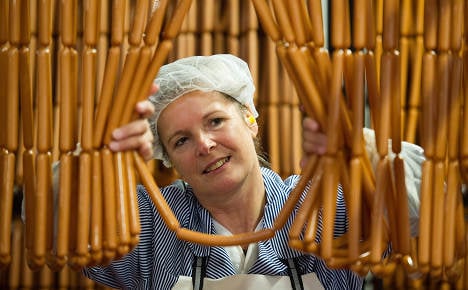The Ifo institute’s closely watched business climate index for Europe’s top economy rose to 104.2 points in January – its highest reading since June – from 102.4 points a month earlier.
Economists polled by Dow Jones Newswires had been pencilling in a more modest rise to 103.0 points. “The German economy made a promising start to the new year,” said Ifo president Hans-Werner Sinn.
“The Ifo business climate rose for the third time in succession. Assessments of the current business situation were somewhat more positive after deteriorating last month. Future business prospects improved considerably,” Sinn said.
Ifo calculates its headline index on the basis of companies’ assessments of their current business and the outlook for the next six months.
The sub-index measuring current business rose to 108.0 points in January, making good the slight decline seen last month. And the outlook sub-index jumped to 100.5 points, its highest reading since May.
“The German economy has put the crisis behind it,” said Berenberg Bank economist Christian Schulz.
“Germany is roaring back to growth in the new year 2013.” Official gross domestic product (GDP) data showed that Germany turned in its weakest growth in four years in 2012, with an estimated contraction of around 0.5 percent in the fourth quarter alone.
But there is growing consensus that the dip in growth will prove shortlived.
Already earlier this week, the ZEW investor sentiment index soared to the highest levels since the start of the eurozone debt crisis in 2010 as the German economic outlook looks ever brighter.
And on Thursday, another forward-looking indicator, the purchasing managers’ index (PMI), notched up its strongest growth in a year. “Signs are growing that the German economy could be heading for a V-shaped rebound in the first quarter of 2013 after output contracted in the fourth quarter of last year,” Schulz said.
“The confidence rebound may still take some time to feed through to hard data such as industrial production, but the fact that all surveys (PMIs, ZEW) and financial indicators point in the same direction inspires confidence in an economic rebound,” the expert said.
According to the Ifo data, almost all sectors of the economy experienced a boost, with industry, services and construction leading the way.
Schulz believed that Germany is “heading for another extended growth period. This will also help its eurozone partners to export their way out of trouble.”
“The crisis is over – at least in Germany and at least if one believes in the forecasting power of the Ifo,” said ING Belgium economist Carsten Brzeski.
“All in all, today’s Ifo index nicely illustrates the green shoots in the German economy. Even if the current harsh winter weather might delay the blossoming out somewhat, growth should return, leaving the contraction of the fourth quarter quickly behind,” he said.
But Capital Economics economist Ben May was not quite so optimistic.
“January’s rise in the Ifo survey provides further hope that the estimated sharp fall in fourth-quarter GDP will be a one off,” he said.
“Nonetheless, given that the effects of the recent appreciation of the euro are unlikely to have been fully felt by exporters, it is too early to conclude that Germany will record a strong and sustained expansion in 2013,” May cautioned.
AFP/jcw



 Please whitelist us to continue reading.
Please whitelist us to continue reading.
Member comments